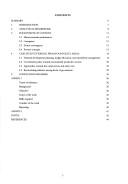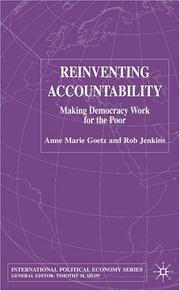| Listing 1 - 10 of 12 | << page >> |
Sort by
|

ISBN: 052165016X 0521659876 0511017375 0511052030 0511151829 0511605870 9780511017377 9780511151828 0511036795 9780511036798 9780511605871 9780521650168 9780521659871 Year: 1999 Volume: 5. Publisher: Cambridge New York Cambridge University Press
Abstract | Keywords | Export | Availability | Bookmark
 Loading...
Loading...Choose an application
- Reference Manager
- EndNote
- RefWorks (Direct export to RefWorks)
Successive Indian governments, from right and left, have remained committed to market-oriented reform since its introduction in 1991. In a well-argued, accessible and sometimes controversial examination of the political dynamics which underlie that commitment, Rob Jenkins challenges existing theories of the relationship between democracy and economic liberalisation. He contends that while democracy and liberalisation are no longer considered incompatible, theorizing over-emphasizes democracy's more wholesome aspects while underestimating its practioners' reliance on obfuscating tactics to defuse political resistance to policy shifts. By focusing on formal political systems, existing research ignores the value of informal institutions. In India it is these institutions which have driven economic elites towards negotiation, while allowing governing elites to divide the opponents of reform through a range of political tactics. In fact, the author argues, it is precisely through such political manoeuvring that democracy survives.
Democracy --- Free enterprise --- Démocratie --- Libre entreprise --- India --- Inde --- Economic policy --- Politics and government --- Politique économique --- Politique et gouvernement --- Democracy. --- Free enterprise. --- Government - Non-U.S. --- Law, Politics & Government --- Government - Asia --- Business, Economy and Management --- Economics --- Démocratie --- Politique économique --- Free markets --- Laissez-faire --- Markets, Free --- Private enterprise --- Bharat --- Bhārata --- Government of India --- Ḣindiston Respublikasi --- Indië --- Indien --- Indii︠a︡ --- Indland --- Indo --- Republic of India --- Sāthāranarat ʻIndīa --- Yin-tu --- インド --- هند --- Индия
Book
ISBN: 9780415776431 9780415776448 9780203081051 9781136171406 9781136171352 9781136171390 Year: 2013 Publisher: New York : Routledge,
Abstract | Keywords | Export | Availability | Bookmark
 Loading...
Loading...Choose an application
- Reference Manager
- EndNote
- RefWorks (Direct export to RefWorks)
Peace-building --- History. --- United Nations --- Peacekeeping forces. --- Peace-buildingHistory.United NationsPeacekeeping forces.
Book
ISBN: 0190686502 9780190686505 Year: 2017 Publisher: New York, NY : Oxford University Press,
Abstract | Keywords | Export | Availability | Bookmark
 Loading...
Loading...Choose an application
- Reference Manager
- EndNote
- RefWorks (Direct export to RefWorks)
India's National Rural Employment Guarantee Act (NREGA), passed in 2005, has been among the developing world's most ambitious anti-poverty initiatives. By 'guaranteeing' 100 days of work annually to every rural household, NREGA sought to advance the Indian constitution's commitment to securing citizens' 'right to work'. This volume is not a technical evaluation of program performance. It offers instead a detailed analysis of the politics surrounding NREGA.
Manpower policy, Rural --- India. --- MGNREGA --- Mahatma Gandhi NREGA --- MANREGA --- Mahātmā Gān̐dhī Naregā --- Mahānaregā

Abstract | Keywords | Export | Availability | Bookmark
 Loading...
Loading...Choose an application
- Reference Manager
- EndNote
- RefWorks (Direct export to RefWorks)

ISBN: 1403906246 1349510122 9786610349166 1280349166 0230500145 Year: 2005 Publisher: Houndmills, Basingstoke, Hampshire ; New York, N.Y. : Palgrave Macmillan,
Abstract | Keywords | Export | Availability | Bookmark
 Loading...
Loading...Choose an application
- Reference Manager
- EndNote
- RefWorks (Direct export to RefWorks)
Administrative agencies --- Government productivity. --- Civil service ethics. --- Political corruption. --- Poor --- Economic assistance --- Administration publique --- Fonctionnaires --- Corruption (Politique) --- Pauvres --- Aide économique --- Management. --- Services for --- Cross-cultural studies. --- Gestion --- Productivité --- Déontologie --- Protection, assistance, etc. --- Etudes transculturelles --- #SBIB:052.IOS --- #SBIB:35H6080 --- #SBIB:35H52 --- #SBIB:327.4H60 --- Bestuur en beleid: nationale en regionale studies: Ontwikkelingslanden --- Ethiek van bestuur en beleid --- Derde wereld: ontwikkeling, sociale verandering: algemeen --- Aide économique --- Productivité --- Déontologie --- Civil service ethics --- Government productivity --- Political corruption --- Public officers --- Elected officials --- Government leaders --- Government officials --- Officers, Public --- Officials, Elected --- Officials, Government --- Officials, Public --- Public officials --- Disadvantaged, Economically --- Economically disadvantaged --- Impoverished people --- Low-income people --- Pauperism --- Poor, The --- Poor people --- Boss rule --- Corruption (in politics) --- Graft in politics --- Malversation --- Political scandals --- Politics, Practical --- Productivity, Government --- Economic aid --- Foreign aid program --- Foreign assistance --- Grants-in-aid, International --- International economic assistance --- International grants-in-aid --- Civil service --- Management --- Professional ethics --- Economic conditions --- Corrupt practices --- Ethics --- Public administration --- Persons --- Social classes --- Poverty --- Corruption --- Misconduct in office --- Capital productivity --- Production (Economic theory) --- Economic policy --- International economic relations --- Conditionality (International relations) --- Political ethics

ISBN: 9781403906243 Year: 2005 Publisher: Basingstoke Palgrave Macmillan
Abstract | Keywords | Export | Availability | Bookmark
 Loading...
Loading...Choose an application
- Reference Manager
- EndNote
- RefWorks (Direct export to RefWorks)
Book
ISBN: 9780198097341 0198097344 Year: 2014 Publisher: New Delhi : Oxford University Press,
Abstract | Keywords | Export | Availability | Bookmark
 Loading...
Loading...Choose an application
- Reference Manager
- EndNote
- RefWorks (Direct export to RefWorks)
Economic zoning --- Régionalisation économique --- India --- Inde --- Economic policy --- Politique économique
Book
Year: 2014 Publisher: New Delhi : Oxford University Press,
Abstract | Keywords | Export | Availability | Bookmark
 Loading...
Loading...Choose an application
- Reference Manager
- EndNote
- RefWorks (Direct export to RefWorks)
India's attempt to boost exports and create jobs by establishing Special Economic Zones (SEZs) represents an intensification of its market-based development paradigm. More than a decade after importing the SEZ concept from China, India contains hundreds of these walled-off, deregulated, low-tax enclaves. But in democratic India, protest movements arose against many proposed SEZs. Through detailed case studies of SEZ development in 11 states, this book examines regional variations in both popular mobilisation and state response.
Economic zoning --- India --- Economic policy
Book
Year: 2014 Publisher: New Delhi : Oxford University Press,
Abstract | Keywords | Export | Availability | Bookmark
 Loading...
Loading...Choose an application
- Reference Manager
- EndNote
- RefWorks (Direct export to RefWorks)
India's attempt to boost exports and create jobs by establishing Special Economic Zones (SEZs) represents an intensification of its market-based development paradigm. More than a decade after importing the SEZ concept from China, India contains hundreds of these walled-off, deregulated, low-tax enclaves. But in democratic India, protest movements arose against many proposed SEZs. Through detailed case studies of SEZ development in 11 states, this book examines regional variations in both popular mobilisation and state response.
Economic zoning --- Business & Economics --- Economic History --- India --- Economic policy
Book

ISBN: 9780198081739 0198081731 Year: 2013 Publisher: New Delhi : Oxford university press,
Abstract | Keywords | Export | Availability | Bookmark
 Loading...
Loading...Choose an application
- Reference Manager
- EndNote
- RefWorks (Direct export to RefWorks)
| Listing 1 - 10 of 12 | << page >> |
Sort by
|

 Search
Search Feedback
Feedback About UniCat
About UniCat  Help
Help News
News